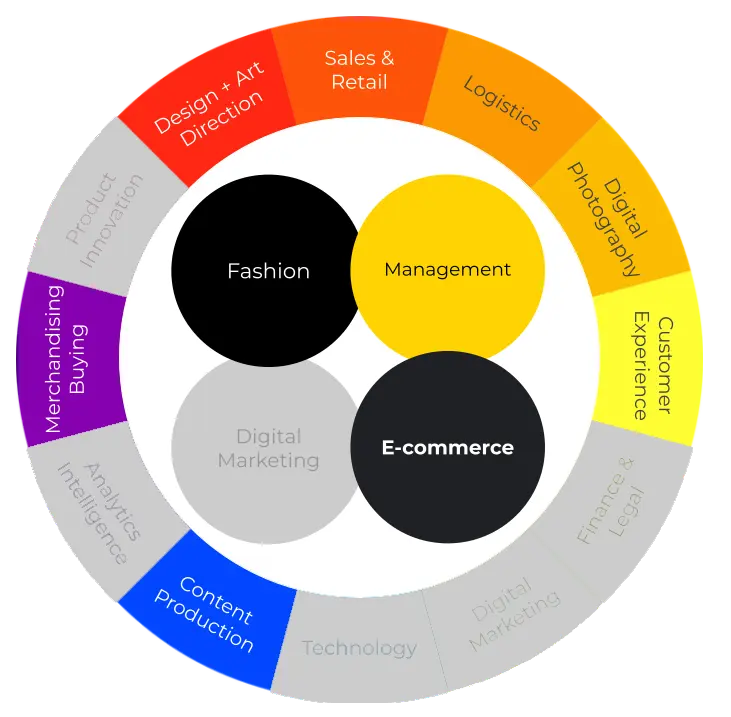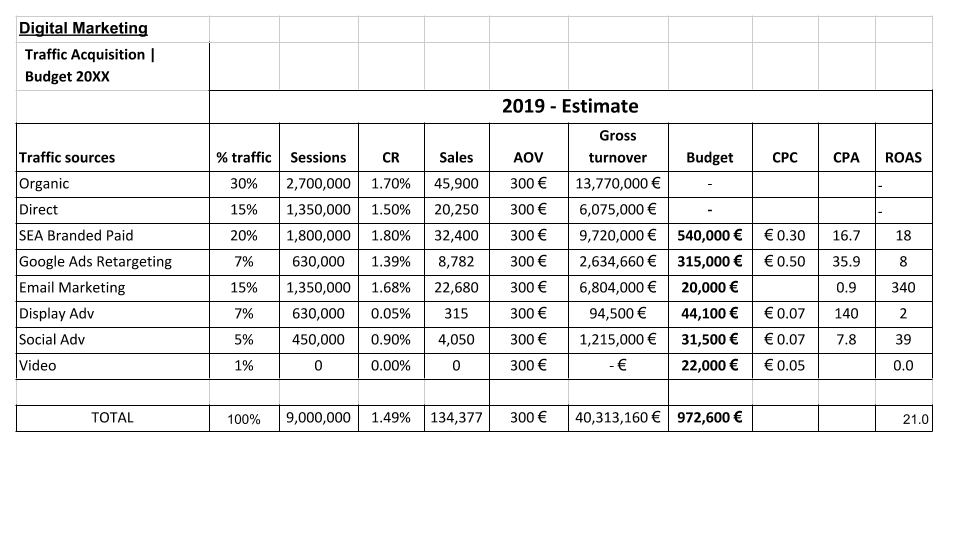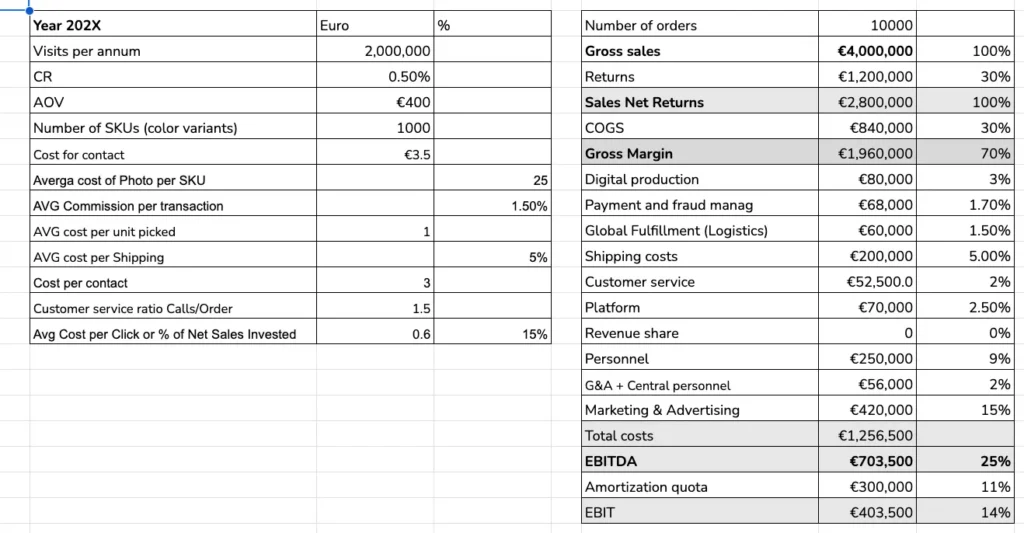Difference Between E-commerce and Digital Marketing
E-commerce and digital marketing are closely related but serve distinct roles in the digital business landscape. Understanding the differences between the two is crucial for businesses looking to maximize their online presence and sales.
- Difference Between E-commerce and Digital Marketing
- 1. Definition
- 2. Core Purpose
- 3. Key Components
- 4. How They Work Together
- 5. Metrics and Success Measurement
- 6. Customer Interaction
- 7. Different skills & responsibilities
- 8. Comparing the curriculum of studies of ecommerce course vs digital marketing course
- Conclusion
1. Definition
- E-commerce (Electronic Commerce):
E-commerce refers to the buying and selling of goods and services over the internet. It involves online stores, marketplaces, and other digital platforms where transactions occur. E-commerce encompasses the entire process of online business operations, including product listing, payment processing, shipping, and customer service. - Digital Marketing:
Digital marketing involves promoting products or services using digital channels such as social media, search engines, email, and websites. Its main goal is to reach potential customers, engage with them, and persuade them to take a desired action, such as making a purchase, signing up for a newsletter, or visiting a website.
2. Core Purpose
- E-commerce:
The primary purpose of e-commerce is to facilitate transactions between buyers and sellers. It focuses on creating an environment where customers can browse products, make purchases, and have those products delivered to them. - Digital Marketing:
Digital marketing’s core purpose is to attract and engage potential customers, build brand awareness, drive traffic to e-commerce sites, and ultimately generate sales. It is about creating demand and guiding consumers through the buying journey.
3. Key Components
- E-commerce Components:
- Online Storefronts: Websites or apps where products are displayed and sold.
- Shopping Cart and Checkout: Systems that handle order processing and payment.
- Inventory Management: Managing stock levels, order fulfillment, and logistics.
- Customer Service: Handling queries, returns, and support.
- Digital Marketing Components:
- Search Engine Optimization (SEO): Improving website visibility in search engine results.
- Content Marketing: Creating valuable content to attract and engage audiences.
- Social Media Marketing: Promoting brands and products on social media platforms.
- Email Marketing: Sending targeted messages to potential or existing customers.
- Pay-Per-Click (PPC) Advertising: Paid ads that appear on search engines or social media.
- Influencer Marketing: Collaborating with influencers to promote products.
4. How They Work Together
- E-commerce relies on digital marketing to attract customers to the online store. Without digital marketing, an e-commerce site might struggle to gain visibility and attract traffic.
- Digital Marketing drives potential customers to e-commerce platforms. It builds brand awareness, creates interest, and generates leads, which can be converted into sales through e-commerce.
5. Metrics and Success Measurement
- E-commerce Success Metrics:
- Sales volume
- Conversion rate (percentage of visitors who make a purchase)
- Average order value
- Cart abandonment rate
- Customer retention and repeat purchase rate
- Digital Marketing Success Metrics:
- Website traffic
- Engagement rate (likes, shares, comments)
- Click-through rate (CTR)
- Cost per acquisition (CPA)
- Return on ad spend (ROAS)
6. Customer Interaction
- E-commerce: Customer interaction is transactional and focuses on the buying experience. It involves navigating product listings, making purchases, and receiving after-sales support.
- Digital Marketing: Customer interaction is about engagement, building relationships, and influencing purchase decisions. It involves creating touchpoints across multiple channels to maintain ongoing communication with the audience.
7. Different skills & responsibilities
- E-commerce Manager Responsibilities: ensure the overall success of the ecommerce business which generally refers to reaching certain targets of revenues and specific levels of profitability. In order to achieve these goals ecommerce managers need to acquire specific financial, technical and organisational skills. Check out our fashion ecommerce management course.
- Digital Marketing: The skills required for digital marketing in the fashion industry range from knowledge of fashion trends to performance marketing, digital PR, social media management, marketing budget management, graphic design, styling and photography. Ideally marketing managers should understand the ecommerce profit and loss statement of ecommerce in order to better interact with the ecommerce team and support them to reach their targets.

8. Comparing the curriculum of studies of ecommerce course vs digital marketing course
Similarities and shared lessons between e-commerce and digital marketing
The digital marketing course and the ecommerce course have in common some lessons. For example both courses begin with the Fashion Industry module which explains the essential notions to work in the fashion industry. For example the fashion product lifecycle, the merchandising structure, the seasons, the distribution channels such as Directly Operated Stores, Wholesale, Franchising and so on. These fashion business notions must be known by both the Ecommerce Team and the Digital Marketing Team.
Another common area between Digital Marketing and Ecommerce is CRM – Customer Relationship Management. The CRM is essentially the governance of all business communications with customers and prospects: customer service emails, newsletters, loyalty messages, replies to customers comments and reviews. Managing online communities, social networks groups and so on.
A third important knowledge area that is essential for both the ecommerce team and the digital marketing team to possess is the Google Analytics or similar web analytics system knowledge. To have a common understanding of how to measure the performance of ecommerce is essential to both teams as every action implemented by the digital marketing team needs to reflect on the ecommerce performance KPIs.
A fourth aspect that Digital Marketing and Ecommerce share is the personal data treatment and the compliance with privacy regulations. Both Ecommerce teams and Digtal Marketing team treat customers’ personal data on a regular basis. Either collecting email addresses for sending newsletter or collecting phisical addresses for shipping or telephone numbers for contact purpose. It’s essential to be able to carry out these activities in compliance with local and international regulations.
Digital Marketing course curriculum of studies
The Digital Marketing Course encompasses the Digital Marketing Strategy, which aims at generating qualified traffic to the digital sales channels; managing efficiently and effectively the digital marketing budget, positioning the brand through digital PR, events, influencers management and other initiatives.
- Digital Marketing Strategy
- Digital Advertising
- Social Media Management
- Content Marketing
- Digital PR
- CRM – Email Marketing
- Legal Aspects: privacy and cookies
Ecommerce course curriculum of studies
The Ecommerce course focus more on the Digital Business Strategy, Financial Planning, Technology, Logistics, Customer Service, User Experience
- Ecommerce Strategy
- Ecommerce Merchandising
- Ecommerce Store Management
- Ecommerce Operations
- Web Design & User Experience
- Financial Planning
- Ecommerce Technology
- Ecommerce law: consumer rights, privacy, etc.
Conclusion
In essence, e-commerce and digital marketing are distinct but complementary components of a successful online business strategy. E-commerce focuses on the transactional side of business—facilitating sales through digital platforms—while digital marketing concentrates on attracting, engaging, and nurturing customers to drive those transactions. Together, they create a complete ecosystem that enables businesses to reach their target audience, convert them into buyers, and retain them as loyal customers.
Digital Marketing and Ecommerce Budgets
In these two examples below you can see the Digital Marketing Budget, which represent the plan of spend for the following year for the Digital Marketing Function, and below the Ecommerce Budget, which is the plan of sales, expenditures and profit that we are targeting to reach for the following year.


hiq1!
Salve. Vi contatto per informazioni per una consulenza di strategie per fare cresce il nostro nuovo sito dedicato alla vendita online. shop.cometalsrl.it